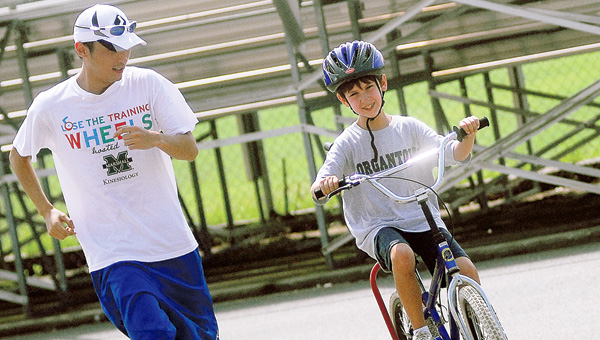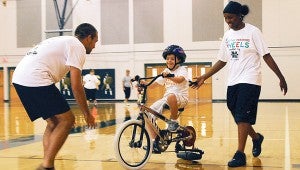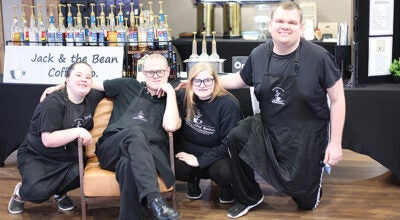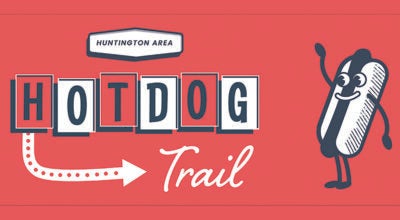On their own
Published 10:47 am Thursday, July 21, 2011

THE TRIBUNE/JESSICA ST JAMES Eight-year-old Grant Burrows has lost his training wheels as he rides around a section of parking lot at Huntington High School with trainer Ben Maggio during the Lose the Training Wheels event Wednesday.
HUNTINGTON, W.Va. — Before this week, 8-year-old Grant Burrows wouldn’t even sit on a bicycle by himself. While his friends would ride around for fun, Grant would not join in.
As a mother of a child with Asperger’s Syndrome, Vicki Burrows described her son as having horrible anxiety with no self-confidence.
To see him on Wednesday, most people would be amazed to see how far he had come so fast.
With no training wheels and no one holding his bike, Grant, all smiles, rode around and around outside the Huntington High School gymnasium, participating in the rite of passage that many children with disabilities struggle with.
Wednesday marked the halfway point for the Lose the Training Wheels program, hosted by the Marshall University kinesiology department at the gym. The non-profit charity travels the U.S. and Canada teaching children with disabilities to ride a two-wheeled bike independently.
“He fell once and he was ready to quit,” Burrows said of Grant’s first day in the program.
By mid-week, Grant told his mom, “I’m glad I didn’t quit.”
“They are having fun,” said Andrea Patrick, a trained supervisor with Lose the Training Wheels. “There have been lots of improvements already.”
This is Patrick’s second year helping with the charity. There are nine fleets that travel during the summer months and 80 events where hosted last year. Patrick said it has been a worthwhile experience.
“This is honestly the most amazing experience I have ever had,” she said. “It gives the riders confidence, higher self-esteem … It changes their lives and their family’s lives.”
The five-day camp starts children on adapted bikes, called roller bikes. Like a training wheel, each bike has a roller on the back that keeps it stable, eliminating wobbling. Through the week, the rollers are changed, tapering at each level, teaching the body how to balance. When the last in a series of eight rollers are removed, the child is left riding a two-wheeled bike on his or her own.
Each bike also has a handle behind the seat for volunteers to assist the riders.
The riders also have the opportunity to pilot a tandem bicycle with a volunteer. Patrick said it helps the volunteers gauge what areas the riders have trouble with.

Trainers Cass Meadows, left, and Erica Woods, right, work with Christopher Norweck during the Lose the Training Wheels event Wednesday at Huntington High School. THE TRIBUNE JESSICA ST JAMES
Michelle Norweck enrolled her 8-year-old, Christopher, in the program also. Christopher has Down syndrome.
“I knew the camp was nationally recognized,” Norweck said, “but it is nice to literally see the rubber hitting the road.”
She said Christopher also had a fall on his first day, but is glad to see he is slowly gaining more confidence. On Wednesday, he was on roller No. 5, three more to go until he was riding on his own.
Norweck said even if her son doesn’t make it all the way through the roller, the camp has taught them how to continue at home.
“His self-esteem and confidence will carry over,” she said. “That is a lesson that is universal.”
Dr. Gregg Twietmeyer, assistant professor of kinesiology at MU, organized the camp and many of the volunteers were students and staff at MU.
“The only mild disappointment we have is we wish we were helping more kids,” he said.
The maximum enrollment for the camp was 40 children, but only 11 signed up.
“We’re hoping to have all 40 spots filled next year,” Twietmeyer said.
Sponsors for the camp this year were Alpha Natural Resources, Brick Street Insurance, Cabell Huntington Children’s Hospital, St. Mary’s Medical Center TIPS and the dean of the college of health professions at MU, Dr. Michael Prewitt.
The last day of the camp is Friday.




